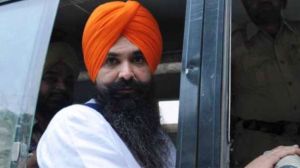Asad Rehman is with the national bureau of The Indian Express and covers politics and policy focusing on religious minorities in India. A journalist for over eight years, Rehman moved to this role after covering Uttar Pradesh for five years for The Indian Express. During his time in Uttar Pradesh, he covered politics, crime, health, and human rights among other issues. He did extensive ground reports and covered the protests against the new citizenship law during which many were killed in the state. During the Covid pandemic, he did extensive ground reporting on the migration of workers from the metropolitan cities to villages in Uttar Pradesh. He has also covered some landmark litigations, including the Babri Masjid-Ram temple case and the ongoing Gyanvapi-Kashi Vishwanath temple dispute. Prior to that, he worked on The Indian Express national desk for three years where he was a copy editor. Rehman studied at La Martiniere, Lucknow and then went on to do a bachelor's degree in History from Ramjas College, Delhi University. He also has a Masters degree from the AJK Mass Communication Research Centre, Jamia Millia Islamia. ... Read More
Jayant Chaudhary: ‘Bhim Army will definitely be part of SP-RLD alliance… a strong part, in the 2027 Assembly and 2024 Lok Sabha polls too’
RLD chief Jayant Chaudhary says: “My plan is to camp in every district of the state where we have influence over the next year. I will be doing a campaign similar to Khatauli. It will be low decibel, high impact”
 Jayant Chaudhary speaks about the “low-decibel, high-impact” campaign he led, his party’s “changing image”, and the RLD's outreach to Dalits. (Twitter/@jayantrld)
Jayant Chaudhary speaks about the “low-decibel, high-impact” campaign he led, his party’s “changing image”, and the RLD's outreach to Dalits. (Twitter/@jayantrld)Rashtriya Lok Dal (RLD) national president Jayant Chaudhary has been dubbed as the architect of the party’s win in a recent bypoll in Khatauli, where it unseated the BJP after its candidate Madan Bhaiyya won the election by 22,143 votes. The RLD candidate, who was supported by the Samajwadi Party (SP), defeated the BJP’s Rajkumari Saini, wife of Vikram Saini, whose disqualification following conviction in a 2013 Muzaffarnagar riots case, led to the bypoll. Chaudhary speaks about the “low-decibel, high-impact” campaign he led, his party’s “changing image”, and the RLD’s outreach to Dalits. Excerpts:
Defeating the BJP in a seat it had won just nine months ago in the Assembly polls, and in 2017, could not have been a mean task. What did you do differently this time?
Jayant Chaudhary: We were able to do a more grassroots-oriented campaign this time and some social combinations were in our favour too. Also, the circumstances of the election – that their MLA was disqualified in a serious riot case… and deemed not worthy of his position. Plus the anti-incumbency against the government, and issues like how the price of sugarcane has not yet been set by the government… It is a complex issue to articulate – why people vote a certain way. While it is difficult to predict, it is also hard to understand.
You were camping in Khatauli for weeks. The national president of a party staying in a constituency before a bypoll isn’t very common.
Jayant Chaudhary: I don’t see it like that. The voters have been associated with us for a long time, they have a right to my time, and they are my priority. One must understand that the entire government and the top BJP leadership was on the other side. They were all camping there. Despite not coming to this region for a long time, the Chief Minister (Yogi Adityanath) encircled Muzaffarnagar by visiting Saharanpur, Meerut. To fix meetings in adjoining districts in the run-up to the bypoll was their strategy. Then, he campaigned in Khatauli as well. Our strategy was to go to the doorstep of the voter. In three villages, I distributed the voter slips myself. I visited every household in the villages. We did micro meetings, no large sabhas, except on November 26, which is Constitution Day. That also worked in our favour as it was the right setting – that we are trying to create a new combination.
Your choice of Madan Bhaiyya as candidate was a surprise, given that he is from the Gujjar community and was considered an “outsider” as he is from Ghaziabad. What was the reasoning?
Jayant Chaudhary: There has been a Gujjar MLA in the past from the seat, so the community does have presence in the constituency. And Madan Bhaiyya is a tall figure. He has been MLA four times, and like all communities, the Gujjars are also looking for their leadership to grow. The BJP may have got votes from the community, but its leaders have not been given important portfolios in the state government. The fact that Madan Bhaiyya is a four-time MLA gave the party (RLD) confidence that he can withstand any kind of pressure and has enough experience to tackle dirty tricks and can ensure a good turnout. And hence despite pressure from the administration, our voters came out and helped us win.
Even the BJP leadership in Khatauli accepts that Dalit and OBC votes, who are in large numbers in the seat, didn’t vote in favour of the party. In the absence of the BSP (in the race), the BJP was relying on the two communities to vote for it. How did you reach out to them?
Jayant Chaudhary: Let me talk of the Dalit community. November 26 was when we really kicked off the campaign and we celebrated Constitution Day and (Azad Samaj Party and Bhim Army chief) Chandrashekhar Azad was there. That sent a strong message of solidarity, as well as that we are there to protect the Constitution. Earlier, I had instructed our MLAs to give a chunk of their MLALAD funds for development work in SC/ST communities. And that is unprecedented because no other party has set an agenda like that. We ran the Bahujan Uday Abhiyan under which we are trying to bring the Bahujan samaj into the mainstream, we spoke about the Hathras case (the gangrape and killing of a Dalit girl). So, there is a context to it, and hence, slowly but surely, a community which was far from us has become open to voting for us. Of course, the BSP was not fighting, and Azad has a presence in the community and the Dalits want their young leaders to grow.
You have been seen with Azad on multiple occasions since the March Assembly polls. You have held meetings with him in Rajasthan too. Can we say that the Azad Samaj Party is now part of the SP-RLD alliance in UP?
Jayant Chaudhary: Yes, he has come on board, and helped us with this campaign. He also went to Rampur and campaigned for the SP candidate (in the recent bypoll). These are telling signs that there is growing confidence between the players. At a social level, I have been interacting with him because it is my job to see possibilities (of coming together) and undercurrents in society, and how these can be addressed. After the state elections in March, I was thinking about how we could increase our vote base, and build a presence beyond our traditional vote bank. With that in mind, I reached out to him and he came on board. That is the context, and I feel it will only go from strength to strength.
Will he be part of the alliance of the SP and RLD in 2024 and the future?
Jayant Chaudhary: Definitely. That is the hope. We haven’t spoken about the details… I think he will be a strong part in the 2027 Assembly elections and 2024 Lok Sabha polls too.
You were the one who started the process for this bypoll by writing a letter to UP Assembly Speaker asking why MLA Vikram Saini was not disqualified after his conviction, while SP MLA Azam Khan was after sentencing in a hate speech case.
Jayant Chaudhary: The wheels of justice were always turning. They have their own pace. And we must stay confident that the rule of law will be followed, and that is what happened in this case as well.
Have you started building a strategy for the 2024 Lok Sabha polls and the future, and what will you do differently now?
Jayant Chaudhary: We have rejigged our organisation. My aim is to increase the footprint of our frontal organisations. Because that is how we can improve our outreach. We have 15 frontal organisations and they have state chiefs in place. After the win, I will be going to Khatauli on December 18 to thank the people, and I will announce our future programmes. My plan is to go and camp in every district of the state where we have influence over the next year. I will be doing a campaign similar to Khatauli on the grassroots level. It will be low-decibel, high-impact.
Photos



- 01
- 02
- 03
- 04
- 05





























